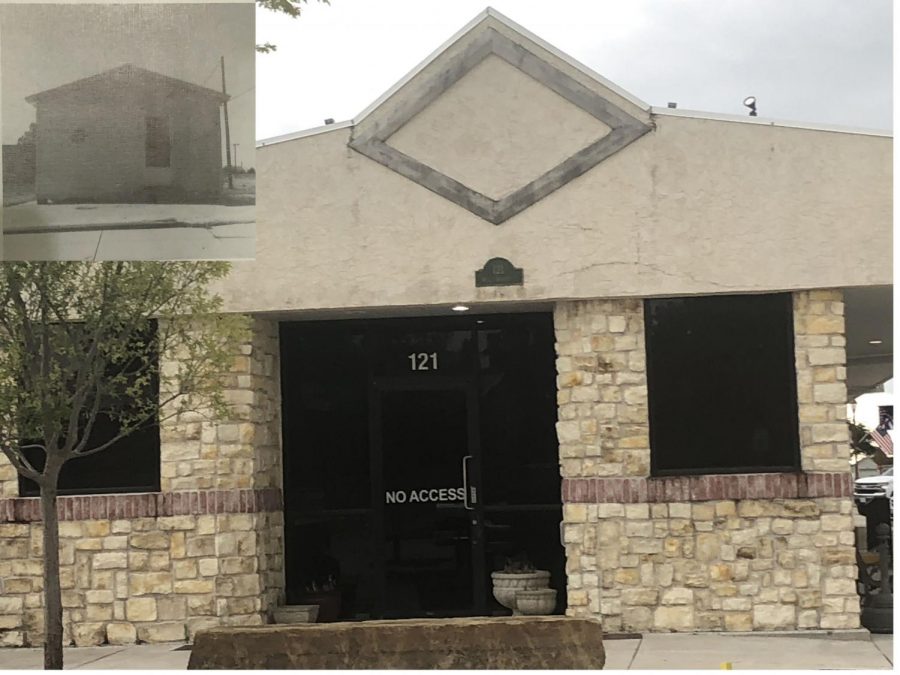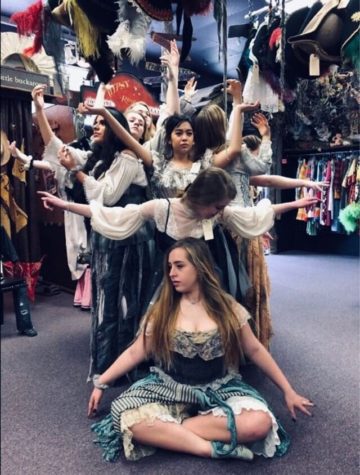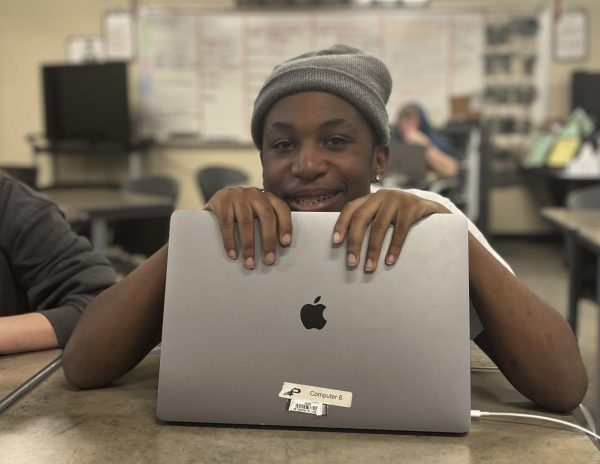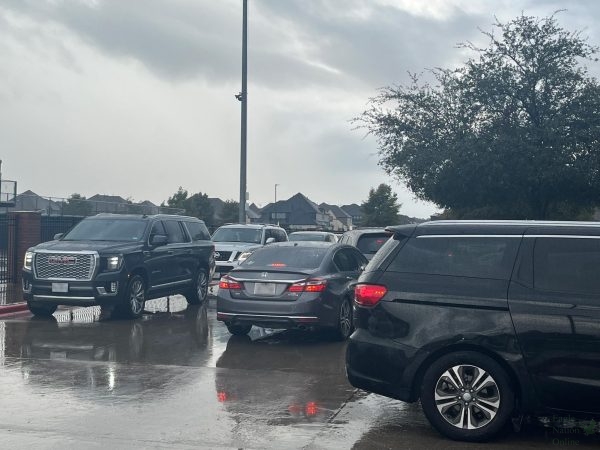Column: Writer reflects on generational changes to town, school
In the left corner, an old black-and-white photo of an earlier building sits ready for comparison with the current Prosper police dispatch center, now located in that same location. In the attached column, writer Rusty Joe Gonzales takes a look back at Prosper history. “It was a lot of things, a small cafe, a place to pay your bills,” Joe Gonzales said when explaining the original site. “It’s definitely been through a lot of changes through the years.”
Prosper, where “Small town, big heart” has rung true since it was established in 1902 as just another stop on the St. Louis, San Francisco and Texas Railway. Just another small town to load and unload grain and cattle, a small town of about 500 people in 1914, which grew to 9,721 in 2010. A town that went from fitting 3,000 people into the Eagle Stadium for some football under the Friday night lights to building a $53 million stadium that seats 12,000 people. Now, it hosts the fastest growing school district in the state.
This shows the exponential growth the town has faced as towns like McKinney, which boomed in 2000 with a population growth of 33,086, and Celina, which boomed in 2018 with a population growth of 2,625. These numbers show a recent trend of people moving north, which could be called a “Northward Expansion,” that continues to happen year after year as people move from bigger cities like Dallas to towns like ours and Frisco along the Dallas North Tollway, or towns like Richardson, Allen, Plano and McKinney, which fall along U.S. route 75. Maybe the growth could be attributed to the ever-expanding U.S. route 380. Regardless of the causes, Prosper has grown and changed in a years-long chain of events that is definitely not new to the Dallas/Fort Worth Metroplex, and especially not new across the United States as people escape from the hustle and bustle of big cities into the quiet suburbs.
People like my dad, who has lived here his whole life, have seen plenty of change. Ms. Jordan Loving, an agricultural sciences teacher here, who has been in the town for 20 years, graduated from Prosper when the high school was still in the building that currently holds Reynolds Middle School. When Loving first moved here in 2000, she remembers there being only one stoplight, which was located at Preston road and Broadway Street.
As far as schooling goes, she remembers the district had one elementary school, which was Judy Rucker Elementary; one middle school, which is now what we know as the district administration building; and one high school which is now Reynolds Middle School. They all served together when the district was 2A by the University Interscholastic League designations. Since Loving moved here, the district has added an additional 11 elementary schools, four middle schools, and two giant high schools. Now, Prosper High competes as a UIL 6A district, and Rock Hill will compete as a 5A one.
Loving recounts that the opening of the Subway at Tiger Mart was a big deal. As far as food goes, she said there was the Sonic Drive-In, but no pizza places or restaurants. The town didn’t have Walmart or Kroger, which caused people to drive to McKinney or Frisco for groceries. Even I remember making that grocery trip with my mom for the first 12 years of my life. One of the traditions that that Loving said she thinks has died out is the school’s old football rivalry against Celina High School, which is just up the road from us. She remembers the time when Prosper won the state championship, and fans stormed the field against Celina. Now, I would have to assume that one of our biggest rivalries is against 6A Allen High School.
Loving said she remembers the small-town feel that was within the town as she grew up, and how that has changed. I believe the “feel” is still there, to an extent, within the grade levels. Students still know other people in their grade on a first-and-last-name basis, but they may not know everyone even in each class they take now. Loving said her graduating class included almost 200 people, and everyone knew everyone else’s name, what sports they played and who they shared classes with each day. A tradition that she remembers that could make a comeback was the bonfire during homecoming week.
Sophomore Cooper Smith grew up here, as well. He said he remembers the town when it was relatively small and a lot more rural, with not as many schools built and only a few streets of houses, which is nowhere near the number of neighborhood subdivisions that we have now. The biggest change Smith has noticed is how many schools have been built as well as the 6A size of Prosper High – even after a second high school opened. But, he also noted the huge spike in population and houses being built and all the new convenient businesses that have moved here. Smith said that he wishes the feeling of a small town where everyone knew each other could come back, but he doesn’t think it can at this point in the town’s growth.
Sophomore Sarah Nelson has lived in Prosper since she was in third grade. When she first moved here, the town was a lot less populated, and she described the town as it was set out as “pretty cool.” Since then, she said the Town of Prosper has handled the growth and construction of buildings and houses really well. Nelson’s family has moved through three houses in the town due to the growth, saying that it was much harder to find and buy a house because of all the new neighborhoods.
Needless to say, the town has grown in a pattern that is definitely not new to the Dallas/Fort Worth area, and especially not new to the United States. People will get tired of the hustle and bustle of city life, and move out to smaller suburbs surrounding the cities, which leads to massive growth and massive construction across the country. We are getting people from all over the country – and even all over the world. So next time you find yourself sitting next to someone new to you, start a conversation and ask (politely) where they’re from. You could hear an interesting story or two and learn about a culture previously unknown to you. You may even learn something you didn’t know about your own hometown.
Your donation will support the student journalists of Prosper High School. Your contribution will allow us to purchase equipment and cover our annual website hosting costs.

Honors, Experience and Awards:
- Quill & Scroll Honor Society Member
- Former Social Media Co-Director for ENO
- 2 Best of SNO Publications
- 2021 TAJE Honorable Mention Cell Phone Photo - Convention
- TAJE Best in Texas 2022 - Excellent - Story Portfolio
- TAJE Best in Texas 2022 - Excellent - Feature Story
- TAJE Best in Texas 2022 - Honorable Mention - Photo Gallery
- TAJE Story of State - 2nd Place












